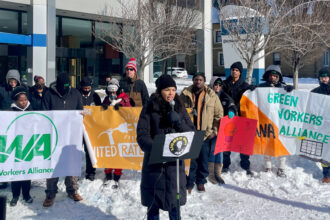Senate Votes on Blocking EPA Greenhouse Gas Regs (AP)
In the absence of congressional action on climate change, the Senate is heading toward a much-watched vote on whether the Obama administration should be allowed to go ahead with regulations curtailing greenhouse gas emissions.
Energy Secretary Welcomes Republican Climate Bill (Reuters)
Energy Secretary Steven Chu on Wednesday gave limited support to a Republican senator for introducing an alternative climate bill that would limit emissions by less than Pres. Obama wants to, but would also take steps to reduce U.S. dependence on oil.
A Call to Triple U.S. Spending on Energy Research (New York Times)
In a study released today, a diverse group of business executives urged the government to more than triple spending on energy research and development, to $16 billion a year.
Lawmakers Press Interior on Drilling Ban Length (Reuters)
Lawmakers grilled Interior Secretary Ken Salazar on Wednesday about his department’s six-month ban on deepwater drilling, a decision they said may cost the already battered Gulf of Mexico region thousands of jobs.
Lead U.S. Spill Agency Running Short of Cash, Rep. Oberstar Says (Greenwire)
The Coast Guard could run out of money for its emergency response to the massive Gulf of Mexico oil spill as soon as next week, the House chairman with jurisdiction over the agency said today.
Tenn. Senate Nixes Push to Revive Coal Mining Bill (AP)
The state Senate on Wednesday defeated an effort to resurrect a bill to curb mountaintop removal coal mining in Tennessee.
UN’s New Climate Chief Says Final Deal Unlikely in Her Lifetime (Bloomberg)
Christiana Figueres, a Costa Rican who on July 8 will take the helm of the UNFCCC, said an all-encompassing deal is unlikely to happen in her lifetime.
Rich Nations Could Increase Emissions Under Pledge Loopholes, UN Data Shows (Guardian)
Developing countries said they were shocked by new UN data showing that rich nations will be able to increase their carbon emissions by up to 8% if they take advantage of a series of major loopholes in their pledges.
Cutting Fuel Subsidies Will Cut CO2 Emissions: OECD (AFP)
Phasing out fossil fuel subsidies should cut greenhouse gas emissions by 10% from levels they would otherwise reach in 2050, the OECD said Wednesday.
Biofuels from Deforested Land to Fail EU Standards (Reuters)
Palm oil grown on recently deforested land is unlikely to be acceptable for use in European biodiesel, a draft report from the European Commission shows.
Stanford Survey Finds More Doubt Global Warming (San Francisco Chronicle)
A new Stanford University survey has found that 74% of those polled believe the world’s temperature has been gradually rising over the past century, compared with 85% who believed it in 2006.
Fate of Climate Bill Uncertain as Japan Poll Nears (Reuters)
Japan’s government could run out of time to enact a climate bill before upper-house elections expected next month, fueling worries it might drop a plan to trade carbon emissions by setting obligatory caps on firms.
Wyoming Now Requires Disclosure of Fracking Chemicals (Houston Chronicle)
Wyoming regulators have approved rules requiring oil and gas drillers to disclose chemicals used in hydraulic fracturing — making it the first state to order companies to do so.
Global Warming Spells Doom for Asia’s Rivers (AFP)
The livelihood of thousands of Tibetans living on China’s highest plateau is under threat as global warming and environmental degradation dry up water sources for three mighty Asian rivers, experts say.
About This Story
Perhaps you noticed: This story, like all the news we publish, is free to read. That’s because Inside Climate News is a 501c3 nonprofit organization. We do not charge a subscription fee, lock our news behind a paywall, or clutter our website with ads. We make our news on climate and the environment freely available to you and anyone who wants it.
That’s not all. We also share our news for free with scores of other media organizations around the country. Many of them can’t afford to do environmental journalism of their own. We’ve built bureaus from coast to coast to report local stories, collaborate with local newsrooms and co-publish articles so that this vital work is shared as widely as possible.
Two of us launched ICN in 2007. Six years later we earned a Pulitzer Prize for National Reporting, and now we run the oldest and largest dedicated climate newsroom in the nation. We tell the story in all its complexity. We hold polluters accountable. We expose environmental injustice. We debunk misinformation. We scrutinize solutions and inspire action.
Donations from readers like you fund every aspect of what we do. If you don’t already, will you support our ongoing work, our reporting on the biggest crisis facing our planet, and help us reach even more readers in more places?
Please take a moment to make a tax-deductible donation. Every one of them makes a difference.
Thank you,











